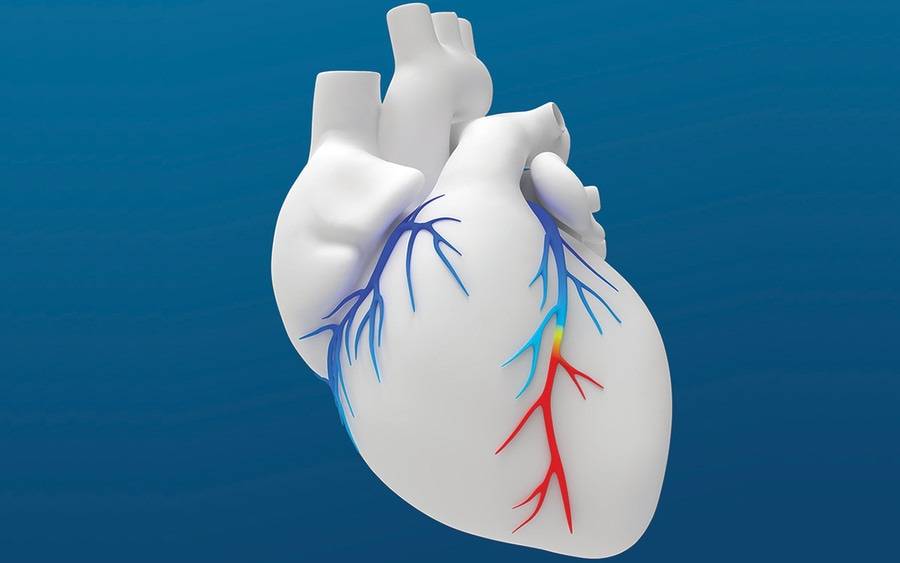Scripps La Jolla First Hospital in County to Adopt Novel Non-Invasive Tool for Diagnosing Coronary Artery Blockage
HeartFlow reduces unnecessary procedures, lowers costs

The HeartFlow FFRct Analysis is a non-invasive tool that helps Scripps cardiologists identify possible areas of coronary artery blockage.
HeartFlow reduces unnecessary procedures, lowers costs
Scripps Memorial Hospital La Jolla has launched the HeartFlow FFRct Analysis for patients with coronary artery blockage, becoming the first hospital in San Diego County to offer this innovative, cost-saving technology.
The system, which has been cleared by the Food and Drug Administration, uses conventional CT scan images to generate a personalized, digital 3-D model of each patient’s coronary arteries. Powerful computer algorithms then solve millions of complex equations to assess the impact of blockages on blood flow. Using this information, physicians can determine the appropriate course of action – lifestyle, medical, stent or surgical -- for each patient.
With more conventional care, doctors determine whether the blockage requires clearing while performing a coronary angiogram, an invasive procedure performed under local anesthesia in a catheterization laboratory. However, research has found that more than half of the 385,000 patients who undergo a diagnostic cath lab coronary angiogram each year in the United States actually have no need for that procedure because no blood flow-limiting blockage is found.
“The new system provides additional information that might help us better determine the right approach for a patient,” said Jorge Gonzalez, MD, a Scripps Clinic cardiologist who specializes in cardiac CT and MRI.
Collaboration between cardiology, radiology departments
The launch of the service at Scripps La Jolla represents a significant and unique collaboration between the campus’ cardiology and radiology departments.
“Medical specialists have a long history of operating within their own silos of focused care, but advancing technologies and science are helping to eliminate those traditional barriers for the benefit of patients and our broader health system,” said George Wesbey, MD, a cardiovascular radiologist with Scripps Clinic. “At Scripps, we are proud to be on the leading edge of that trend. This is a game-changing technology that benefits both our patients and our health system.”
Coronary artery disease is the most common type of heart disease in the United States, and it is the leading cause of death for both men and women, killing about 610,000 people each year, according to the U.S. Centers for Disease Control and Prevention.
The disease develops when the arteries leading to the heart narrow, often because of the buildup of plaque in the vessel walls. The coronary narrowing can reduce blood flow to the heart, causing chest pain, heart attacks and death.
Avoiding unnecessary procedures
Studies have shown that by improving the accuracy of non-invasive tests used to evaluate coronary artery disease, unnecessary invasive coronary angiograms can safely be avoided.
In the most recent clinical trial comparing HeartFlow with usual care, a HeartFlow-guided approach showed an 83 percent reduction in the number of patients who underwent a planned invasive coronary angiogram, only to find that they in fact had no obstructive disease. The study also showed a 32 percent reduction in the 90-day per-patient cost of medical care among patients receiving a HeartFlow analysis, excluding the cost of the service. Even when including the likely cost using typical reimbursement levels, the study authors concluded the HeartFlow approach would save money.
Earlier this month, the Centers for Medicare & Medicaid Services cleared the HeartFlow service for outpatient reimbursement starting Jan. 1, 2018. Most private health insurers also will begin covering the cost of the analysis by that date.
Each year more than 76,000 patients receive their cardiovascular care from Scripps, making it San Diego County’s largest heart care provider. U.S. News & World Report ranks the cardiology and heart surgery programs at Scripps La Jolla No. 1 in the region and among the best in the nation.
Learn more about Scripps Health, a nonprofit integrated health system in San Diego, Calif.